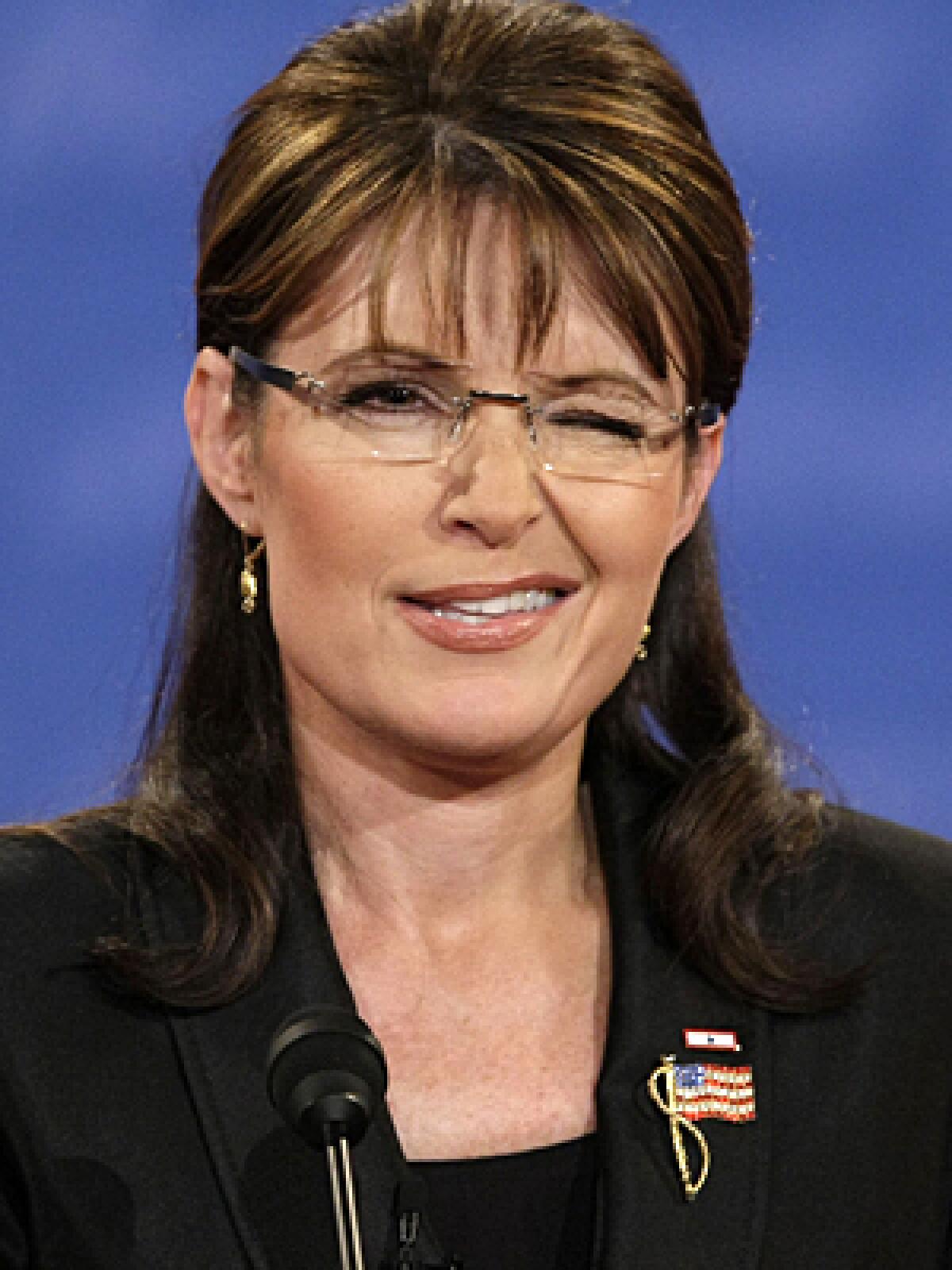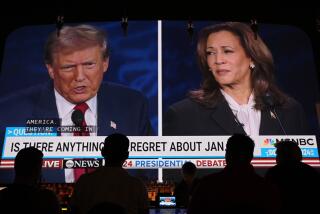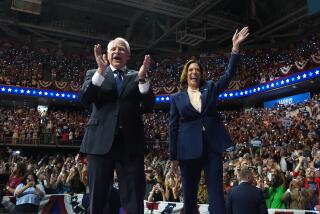Sarah Palin stirs up controversy in the wink of an eye

WASHINGTON -- Voters have by now memorized Sarah Palin’s string of historic firsts on a Republican presidential ticket: first woman, first hockey mom, first moose dresser. Now it turns out the 44-year-old Alaska governor has injected another groundbreaker into national politics.
She’s a winker. She winks on rope lines and at rallies. She winked at least six times at 70 million viewers on the vice presidential debate platform opposite her rival, Sen. Joe Biden, who weighed in on the nonverbal communication scale by grinning like a nutcracker.
But it was the wink that ricocheted like a bullet across America, leaving some voters smitten, some confused and others nauseated.
A honking sound from her armpit might have generated less buzz. That would have been just weird. The wink is ambiguous, one of those rich, laden, intriguing signals of unspoken human messaging that is difficult to decipher but impossible to ignore.
There is not a lot of research on the origins of the wink. Some have suggested a rather gloomy start -- from the word “hoodwinked,” which may have stemmed from the custom of placing a hood over the heads of those about to be hanged. The Bible warned against it in Proverbs: “Whoever winks the eye, causes trouble.”
But somewhere along the way, the wink shed its onerous baggage and became a signal of something playful, knowing, flirtatious or suave, depending on who is doing the winking and in what context. David Niven, Paul Newman and Lucille Ball were winkers (recall “Vitameatavegamin”).
In Latin America, it’s a sexual invitation; in Nigeria, a parental signal that it’s time for the kids to leave the room. Some in China consider it rude.
Here, a wink can change the meaning of a sentence: “My kid always gets straight A’s.” Wink. Wink. It can invite camaraderie. The wink is a powerful gesture, much more so than the wave favored by most politicians because it generates from the ground zero of human emotion -- the face -- in the eyes no less, the gateway to the soul.
“The face is primo -- it’s how we read each other. Much more than hand gestures, it plays an astounding role in how people bond or interpret each others’ behavior,” said Betsi Grabe, a telecommunications professor at Indiana University. Grabe is co-author of the upcoming book, “Image Bite Politics,” about the visual framing of elections.
In order to achieve the desired effect, however, a wink requires mutual admiration and a receptive source. (Any woman who has sat across a bar from an unwelcome suitor can attest to this.)
Otherwise, it tends to confuse people or bum them out, as was the case with a man who recently blogged his frustration to City-Data.com after he noticed women winking at him during a six-month period. When his wife could not explain it, he turned to cyberspace. “I don’t know how to react when I get winked at -- I just ignore [it] as if it never happened. How am I supposed to react when I get winked at?? I don’t understand the full ramifications of the wink???,” wrote IamInShape.
The answer from MontanaGuy was of little comfort: “I’ve lived a long time but I’m not familiar with perpetual winking from the opposite sex. Could it be that you haven’t bathed for some time and the winking is just a natural reaction to a repugnant smell?”
Small wonder, then, that Palin’s winking performance -- not at a particular target but full blast at a vast and diverse audience during history’s most-watched vice presidential debate -- shot like an arrow into American living rooms.
Those who already liked her were charmed, part of an adoring crowd acknowledged by a rock star. Those who disliked her were repelled. “Who do you think you are, trying to bond with me?” Of course, she never had those votes anyway.
It’s the undecideds who most matter. Research shows that ambiguous gestures like a wink are risky on a medium such as television, particularly when aimed at an audience that the speaker wants to persuade, said Erik Bucy, an expert in nonverbal communication at Indiana University and Grabe’s co-author.
“The viewer starts to evaluate the source more closely, and often the evaluation turns negative,” Bucy said.
So it could be argued that winking in a debate was a very “mavericky” thing to do, though experts agree that any male candidate who winked as much as Palin did would be called sexist. In her case, though, it made for an instant hit on YouTube the next day, when there appeared a montage of the governor’s mischievous left eye set to a Neal McCoy country-western carol, “Wink.” (“Don’t need to psychoanalyze or have a stiff drink . . . All she’s gotta do is just give me that wink.”)
Experts can’t remember any other candidate winking so much. Sure, there are photos of the occasional wink by the first President Bush, Republican presidential nominee John McCain, his Democratic rival Barack Obama and Biden.
President George W. Bush is a rather devoted winker: at a State of the Union address, during a news conference with the prime minister of Japan and, with somewhat unfortunate consequences, at the queen of England, just after inadvertently suggesting that she was around in 1776. She was not amused.
Ever since Richard Nixon mopped his sweaty brow on the road to defeat in the 1960 presidential debate against John F. Kennedy, it has been well known that nonverbal cues can weigh as heavily with voters as the millions of words uttered on the stump. It is in part why campaigns spend so much on media coaches.
Obama’s relaxed, folded-arms stance and pleasant expression while McCain was trying to skewer him at Wednesday’s debate was probably no accident (and strikingly reminiscent of Bill Clinton’s successful posture in a similar setting against George H.W. Bush and Ross Perot in 1992).
As for the wink?
“It’s a Rorschach test,” said Kristen Monroe, an expert on political psychology at UC Irvine. “People see in it what they want.”
But, since all of life is said to be reducible to a “Seinfeld” episode, it is probably worth noting that when George Costanza got grapefruit juice in his eye and spent the day winking uncontrollably, he nearly got promoted.
More to Read
Sign up for Essential California
The most important California stories and recommendations in your inbox every morning.
You may occasionally receive promotional content from the Los Angeles Times.










